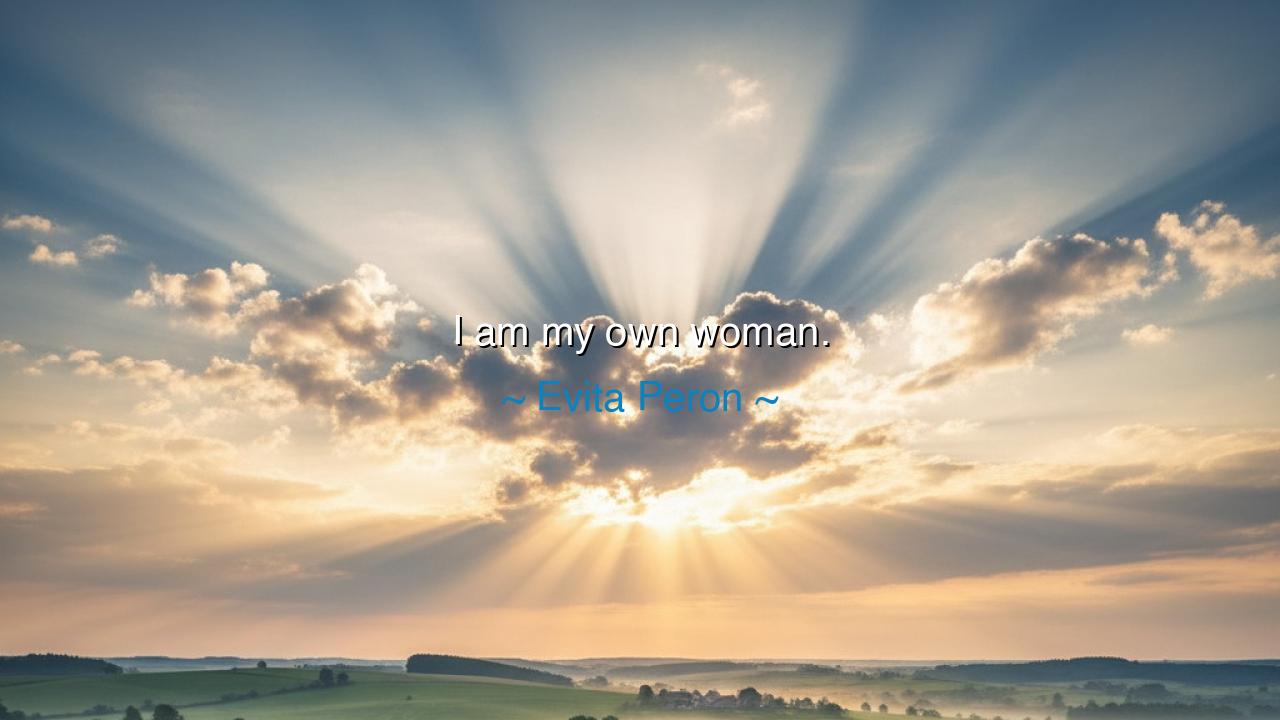
I am my own woman.






Hear the cry that echoes across the ages, the words of Evita Perón: “I am my own woman.” This is no whisper of vanity, no idle boast—it is the roar of a soul that has broken free from the chains of dependence, tradition, and silence. It is the declaration of one who stands not as an ornament in the shadow of another, but as a sovereign being, master of her own destiny. In those five words, Evita gave voice to countless women who, for centuries, had been unseen, unheard, and unacknowledged.
The meaning of this quote lies in the assertion of selfhood. To be one’s own woman is to claim identity, not borrowed from husband, father, or society, but forged in the fire of one’s spirit. It is to walk into the world not as a reflection of others, but as a light unto oneself. For generations, women were bound to roles dictated by others—the obedient daughter, the dutiful wife, the silent widow. But in Evita’s proclamation, the old bonds are shattered, and a new vision rises: a woman who stands firm, self-determined, and unafraid.
Evita herself embodied these words. Born into poverty, she did not accept the script written for her by fate. She rose, not by meek compliance, but by fierce will and unyielding resolve. As First Lady of Argentina, she did not simply remain a ceremonial figure, content to smile in silence. Instead, she seized the mantle of power to champion the poor, the working class, and the forgotten. She faced the hatred of elites, the suspicion of rivals, and the constraints of her own gender, yet she never bowed. With voice aflame, she declared: “I am my own woman,” and in so doing, she inspired millions to rise with her.
History, too, offers echoes of such defiance. Recall Joan of Arc, the peasant girl who dared to lead armies under the banner of heaven. She did not wait for permission to act, nor did she allow men of power to dictate her worth. She stood before kings and generals and proclaimed with her very life: I am my own woman. Though fire consumed her body, her spirit became immortal, a testament to the power of self-possession and unyielding faith in one’s calling.
The emotional weight of Evita’s words is not hers alone, but the inheritance of all who hear them. To say “I am my own woman” is not only to resist oppression, but also to reject the inner voices of doubt, fear, and dependency that whisper we are not enough. It is a summons to courage, to believe in the worth of our own being even when the world denies it. It is the reminder that dignity comes not from titles or approval, but from the unwavering embrace of one’s truest self.
What lesson, then, shall we draw from this? That the greatest chains are not of iron, but of expectation. And the greatest freedom is not given—it is claimed. To live as your own woman, or as your own man, is to step beyond the script others would write for you and to author your own story with clarity, strength, and pride. The world may resist; it may mock, it may punish. But the soul that belongs to itself cannot be conquered.
Practical actions follow from this truth: speak your mind, even when silence is safer. Choose your path, even when tradition presses another road upon you. Value your worth, not by comparison with others, but by the radiance of your own integrity. If you are scorned for standing tall, remember Evita, Joan, and countless others who dared the same. And when you waver, repeat the words as a shield and a sword: “I am my own woman.”
Let these words be carried like a flame into the future. For in every age, there will be those who would bind us, and in every age, there must be those who rise to say: No. I belong to myself. And by such defiance, the world itself is remade.






HVNguyen Vu Ha Vi
While 'I am my own woman' exudes confidence and independence, how does this idea stand up against the social, cultural, and economic systems that often limit women’s choices? Can women ever fully be 'their own' without fighting against these external forces, or is this simply a reminder of the importance of self-belief and perseverance in the face of adversity?
HKHanny Kim
Evita Perón’s statement about being her own woman challenges the conventional idea of what it means to be feminine or successful. Does this embody the kind of feminist empowerment that encourages women to embrace their individuality, or does it push against the need for collective support and solidarity among women in society?
DHDuyen Dang Huu
The idea of being 'my own woman' is empowering, but it makes me wonder—how do women navigate a world that often tries to define their worth based on external factors? Can one truly be independent without support, or does this quote speak more to the internal strength required to challenge those societal norms?
GB0684 Truong Gia Bao
Evita’s declaration feels like a bold affirmation of self-determination. But does being 'your own woman' mean rejecting the influence of others, or can it coexist with strong relationships and partnerships? How does one balance personal autonomy with the value of community and collaboration, especially when facing societal expectations?
ADKieu Anh Do
Evita Perón’s statement 'I am my own woman' is a powerful declaration of independence and self-empowerment. But does this claim fully embrace the complexities of being a woman in a world where societal pressures often dictate our roles? How do we reconcile the desire for independence with the need for connection and collaboration in both personal and professional spheres?